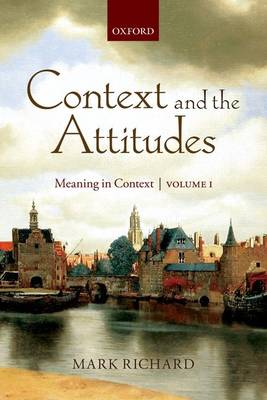
- Afhalen na 1 uur in een winkel met voorraad
- Gratis thuislevering in België vanaf € 30
- Ruim aanbod met 7 miljoen producten
- Afhalen na 1 uur in een winkel met voorraad
- Gratis thuislevering in België vanaf € 30
- Ruim aanbod met 7 miljoen producten
Zoeken
€ 41,95
+ 83 punten
Omschrijving
Context and the Attitudes collects thirteen seminal essays by Mark Richard on semantics and propositional attitudes. These essays develop a nuanced account of the semantics and pragmatics of our talk about such attitudes, an account on which in saying what someone thinks, we offer our words as a 'translation' or representation of the way the target of our talk represents the world. A broad range of topics in philosophical semantics and the philosophy of mind are discussed in detail, including: contextual sensitivity; pretense and semantics; negative existentials; fictional discourse; the nature of quantification; the role of Fregean sense in semantics; 'direct reference' semantics; de re belief and the contingent a priori; belief de se; intensional transitives; the cognitive role of tense; and the prospects for giving a semantics for the attitudes without recourse to properties or possible worlds. Richard's extensive, newly written introduction gives an overview of the essays. The introduction also discusses attitudes realized by dispositions and other non-linguistic cognitive structures, as well as the debate between those who think that mental and linguistic content is structured like the sentences that express it, and those who see content as essentially unstructured.
Specificaties
Betrokkenen
- Auteur(s):
- Uitgeverij:
Inhoud
- Aantal bladzijden:
- 302
- Taal:
- Engels
Eigenschappen
- Productcode (EAN):
- 9780199557943
- Verschijningsdatum:
- 7/05/2015
- Uitvoering:
- Paperback
- Formaat:
- Trade paperback (VS)
- Afmetingen:
- 155 mm x 231 mm
- Gewicht:
- 476 g

Alleen bij Standaard Boekhandel
+ 83 punten op je klantenkaart van Standaard Boekhandel
Beoordelingen
We publiceren alleen reviews die voldoen aan de voorwaarden voor reviews. Bekijk onze voorwaarden voor reviews.







